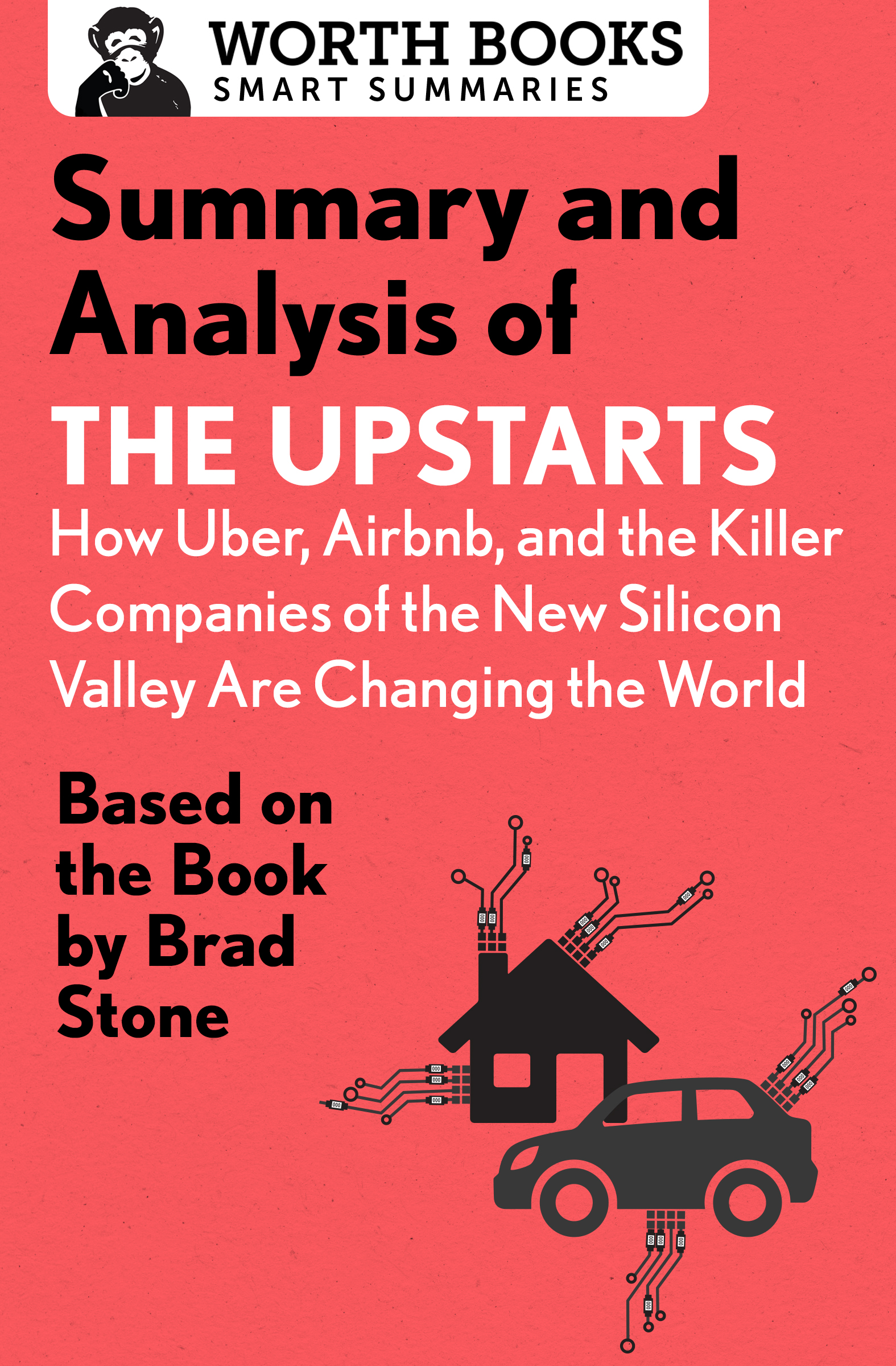Summary and Analysis of
The Upstarts
How Uber, Airbnb, and the Killer Companies of the New Silicon Valley Are Changing the World
Based on the Book by Brad Stone

Contents
Context
Airbnb and Uberwhich have forever changed how we travel and where we stay when we docould never have gotten off the groundwithout several other technical innovations, the two powerhouse apps
The first technological leap came in 2007, when Steve Jobs introduced Apples first iPhone, then announced that it would run mobile applications from third parties. That meant any company could automatically do business with any customer who owned an iPhone. At the same time, Facebooks user base was growing. The online identity created on that social platform could be used to verify both consumers and hosts or drivers of the two upstart companies, and to rate them. And then Google Maps emerged around the same time. A smartphone app that could guide you wherever you wanted to go, it could also be used to find a nearby Airbnb lodging, or let an Uber driver take you to your destination without needing directions from anyone else.
With all these three in place, users of Uber and Airbnb could enjoy seamless, cashless transactions in which neither the host, driver, customer, nor passenger ever have to handle money or calculate a tip. All were empowered by the open ratings systemfor instance, an Airbnb host could see if someone was a terrible tenant, or an Uber passenger could avoid a bad driver. Most important, anyone could drive or be driven, rent or travel, whenever they wanted and on whatever terms. Suddenly, the largest hotel chain in the world operated without owning a single piece of real estate, and the largest taxi fleet on the globe didnt need a garage. Airbnb and Uber rode these technology waves to become two of the fastest growing startups in history. In just eight years (2008 to 2016) Ubers valuation reached $68 billion; Airbnb reached a $30 billion valuation, more than any hotel chain.
Thus began a sharing economy that has changed the way we livebut not without controversy. In early 2017, after the publication of The Upstarts, Ubers brand was rocked by accusations of widespread sexual harassment at the company. In addition, Uber and Airbnb have prompted questions about labor laws, housing laws, what an independent contractor is, and how to define a business. Some people claim the companies have given them extra incomeothers claim that the companies have taken away work that is rightfully theirs. As the valuations grow, so do the unanswered questions. And those answers will define the future.
Overview
In a decade, one online house share and one third-party app transformed the hospitality and transportation industrieswithout owning a single room or car. Brad Stones The Upstarts: How Uber, Airbnb, and the Killer Companies of the New Silicon Valley Are Changing the World is a detailed narrative about the foundingand foundersof both Uber and Airbnb. The book provides insight into Silicon Valley startups and how they transform entire industries, from every anglefrom investors to competitors to regulators.
Stone begins with each companys founders: their personalities, their backgrounds, and their frequent forays into entrepreneurial venturessome successful, most not. He points out the amazing parallels between the companies as they fight for startup capital; find the right framework for their product offerings; and scramble for the best organization, talent, and technology.
Early on, the founders and investors recognized the myriad benefits for Ubers drivers and passengers, Airbnbs hosts and guests. However, they also recognized their offerings would massively disrupt existing transportation companies and the hospitality industry.
The Upstarts lays out national and worldwide battles both companies fought because of that disruption, and details how each companys subsequent innovation is challenged by the establishment. That Uber and Airbnb chose to fight those battles is one of the keys to their success, as has their ability to find the needed investment to continue their relentless growth. Stone provides extensive insight into the few, early investors as well as the stories of the many would-be investors who now regret declining the opportunity.
Summary
Introduction
Author Brad Stone introduces his subjects, Uber and Airbnb, through an anecdote about how the founders of both attended Barack Obamas first inauguration in 2009, when each company was new. Since then, both have grown beyond all expectations, though they have met resistance from all sides.
Part I: Side Projects
Chapter 1: The Trough of Sorrow
The Early Years of Airbnb
Airbnb began as a side project in 2007 as Airbedandbreakfast.com. Brian Chesky and Joe Gebbia, recent graduates of the Rhode Island School of Design, had landed day jobs, but found them deeply unsatisfying. Together, they looked for a business idea that would make a difference in the world. Nathan Blecharczyk, a former roommate of Gebbias, joined the team and brought his programming talent and entrepreneurial drive to the venture.
After launching the companys first website, built with the platform Wordpress, Chesky headed to Austin for the South by Southwest Conference. He stayed at an AirBed & Breakfast, one the two that had signed up from the many hed solicited via Craigslist. While in Austin, Chesky met Michael Seibel, a Silicon Valley entrepreneur who would later serve as their first mentor in navigating the investment community.
For the 2008 Democratic Convention in Denver, they built a new websitethis time, focusing on ease of booking and payment. With several new listings, roughly eighty people used the service for the event. TechCrunch and U.S. News and World Report followed with press exposure. Chesky and Gebbia met Greg McAdoo from the venture capital firm Sequoia Capital. He was to become a vital investor, but not yet.
Running out of money and collecting extensive debt, Chesky and Gebbia entered the Trough of Sorrow, where a new business idea runs out of novelty and needs to start performing. They countered with a breakfast cereal for guests linked to the presidential campaign. There were boxes of Obama Os, the breakfast of change, and Capn McCains, a maverick in every bite. They sent a sample to every media company, and the resulting exposure generated enough sales to recoup their costs and pay off most of their credit cards.
That year, they applied to the Y Combinator startup school for seventeen thousand dollars and a 7% stake in the company. When they pitched their company to Paul Graham, the programs cofounder, he called them cockroaches: they just wouldnt die.
Need to Know: Paul Graham and Greg McAdoo state that mental and emotional toughness, which help you overcome the challenges and negative reactions to anything new, are the most important aspects of any startup. Chesky, Gebbia, and Blecharczyk had it in spades.
Chapter 2: Jam Sessions
The Early Years of Uber
Garrett Camp became a millionaire by cofounding the website discovery engine StumbleUpon, which eBay purchased for seventy-five million dollars. Wealthy and living in San Francisco, he was using town cars to avoid taxis when he began to dream of a company that could mimic a scene from Casino Royale : a car your phone could see in real time as it headed towards you.
In 2008, he registered UberCab.com and established UberCab LLC in California. He called on Oscar Salazar, his old friend from the University of Calgary, to develop a prototype iPhone app that could be used to call cabs, meter the charge per mile, and make effortless payments from a credit card on file. By this time, Camps idea included buying a small fleet of cars to provide the ride services.









